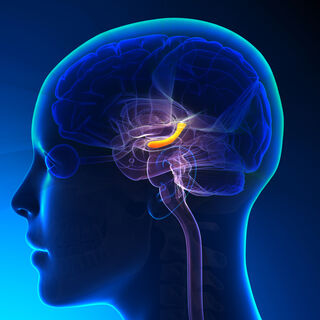Memory
Daydreaming Helps the Brain Pick Up Faint Whispers of Memory
Mind wandering silences brain noise so the cortex can hear the hippocampus.
Posted October 25, 2022 Reviewed by Abigail Fagan
Key points
- When the mind's focus disengages from the task at hand, brain noise gets quieter so the cortex can pick up faint whispers of memory.
- Daydreaming-induced brain silence is caused by inhibition of circuits that communicate with the cortex via the thalamus.
- Reduced thalamocortical excitation makes it easier for the cortex to pick up slow-wave ripples of faint memory from the hippocampus.

For a recent study on the neuroscience of daydreaming, scientists in Norway used optogenetics and other state-of-the-art techniques to investigate brain activity in mice during periods of "quiet wakefulness" that mirror mind wandering in humans.
The Norwegian team's findings (Chambers, Berge, & Vervaeke, 2022) on the cell-type-specific brain mechanics of mind wandering were recently published in the peer-reviewed journal Cell Reports.
During this in vivo mouse study, neuroscientists from the University of Oslo's Vervaeke Lab found that specific cells in thalamocortical circuits that send sensory signals from the body to the cortex via the thalamus are briefly silenced a few seconds before the hippocampus emits faint slow-wave ripples (SWR) of memory.
This research suggests that during daydreaming, faint whispers of memory are sent from the hippocampus in slow-wave ripples to the cortex and that the brain's momentary silence makes it easier for the cortex to "hear" these SWR-related signals.
Daydreaming Quiets Brain Noise and Makes It Easier for the Hippocampus to Be Heard

"You actually daydream for brief moments thousands of times in a day, often just for a few seconds at a time," first author Anna Chambers said in an October 2022 news release. "When we are awake but disengaged—perhaps daydreaming—we are less aware of events that are taking place around us. Our research shows that this happens for a good reason. The brain is busy listening to memories instead."
"During sleep, and in a state called 'quiet wakefulness,' we are usually less aware of what is happening around us. We can daydream or let our minds wander. When we find ourselves in this state, the hippocampus sends electrical impulses that encode various memories," senior author Koen Vervaeke explains.
Mind Wandering May Help Different Brain Regions Store Long-Term Memories
This research suggests that boredom and not paying close attention to a monotonous task makes the brain more receptive to faint or distant memories that might otherwise go unnoticed. These findings also give us some fresh clues about why mind wandering promotes imagination and creativity.
Periods of quiet wakefulness—when the mind wanders and brain noise is silenced—can bring remote memories to the surface and enhance cognition. Without daydreams, memories buried deep within the hippocampus might never bubble up into conscious awareness and could get lost in the shuffle.
"During quiet wakefulness, the hippocampus only sends weak messages about past memories to the rest of the brain. [The cortex] becomes calmer so it can better hear what the hippocampus is trying to say," co-author Christoffer Nerland Berge said.
Instead of paying close attention to every nitty-gritty detail and staying hyper-focused at all times, this research suggests that letting your mind wander and "spacing out" has previously unknown benefits. "With the new findings, we think you might need to be bored and that this is good for forming memories," Vervaeke concludes.
References
Anna R. Chambers, Christoffer Nerland Berge, Koen Vervaeke. "Cell-Type-Specific Silence in Thalamocortical Circuits Precedes Hippocampal Sharp-Wave Ripples." Cell Reports (First published: July 26, 2022) DOI: 10.1016/j.celrep.2022.111132


